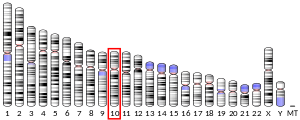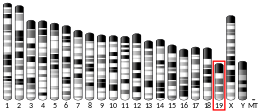IFIT2
Interferon-induced protein with tetratricopeptide repeats 2 or IFIT2 is a protein found in humans which is encoded by the IFIT2 gene.[5][6][7]
Clinical significance
IFIT2 may play a role in prevention of tumor progression.[8] Indeed, IFIT2 gene has been detected progressively downregulated in Human papillomavirus-positive neoplastic keratinocytes derived from uterine cervical preneoplastic lesions at different levels of malignancy.[9] For this reason, this gene is likely to be associated with tumorigenesis and may be a potential prognostic marker for uterine cervical preneoplastic lesions progression.[9]
References
- GRCh38: Ensembl release 89: ENSG00000119922 - Ensembl, May 2017
- GRCm38: Ensembl release 89: ENSMUSG00000045932 - Ensembl, May 2017
- "Human PubMed Reference:". National Center for Biotechnology Information, U.S. National Library of Medicine.
- "Mouse PubMed Reference:". National Center for Biotechnology Information, U.S. National Library of Medicine.
- Wathelet MG, Szpirer J, Nols CB, Clauss IM, De Wit L, Islam MQ, Levan G, Horisberger MA, Content J, Szpirer C (Nov 1988). "Cloning and chromosomal location of human genes inducible by type I interferon". Somat Cell Mol Genet. 14 (5): 415–26. doi:10.1007/BF01534709. PMID 3175763.
- Wathelet MG, Clauss IM, Content J, Huez GA (Jun 1988). "The IFI-56K and IFI-54K interferon-inducible human genes belong to the same gene family". FEBS Lett. 231 (1): 164–71. doi:10.1016/0014-5793(88)80724-5. PMID 3360121.
- "Entrez Gene: IFIT2 interferon-induced protein with tetratricopeptide repeats 2".
- Lai KC, Chang KW, Liu CJ, Kao SY, Lee TC (2008). "IFN-induced protein with tetratricopeptide repeats 2 inhibits migration activity and increases survival of oral squamous cell carcinoma". Mol. Cancer Res. 6 (9): 1431–9. doi:10.1158/1541-7786.MCR-08-0141. PMID 18819931.
- Rotondo JC, Bosi S, Bassi C, Ferracin M, Lanza G, Gafà R, Magri E, Selvatici R, Torresani S, Marci R, Garutti P, Negrini M, Tognon M, Martini F (April 2015). "Gene expression changes in progression of cervical neoplasia revealed by microarray analysis of cervical neoplastic keratinocytes". J Cell Physiol. 230 (4): 802–812. doi:10.1002/jcp.24808. PMID 25205602.
Further reading
- Lafage M, Clauss I, Couez D, Simonetti J, Wathelet MG, Huez G (1992). "The interferon- and virus-inducible IFI-56K and IFI-54K genes are located on human chromosome 10 at bands q23-q24". Genomics. 13 (2): 458–60. doi:10.1016/0888-7543(92)90272-T. PMID 1377167.
- Wathelet MG, Clauss IM, Content J, Huez GA (1988). "Regulation of two interferon-inducible human genes by interferon, poly(rI).poly(rC) and viruses". Eur. J. Biochem. 174 (2): 323–9. doi:10.1111/j.1432-1033.1988.tb14101.x. PMID 2454816.
- Ulker N, Zhang X, Samuel CE (1988). "Mechanism of interferon action. I. Characterization of a 54-kDa protein induced by gamma interferon with properties similar to a cytoskeletal component". J. Biol. Chem. 262 (35): 16798–803. PMID 3119591.
- Levy D, Larner A, Chaudhuri A, Babiss LE, Darnell JE (1987). "Interferon-stimulated transcription: isolation of an inducible gene and identification of its regulatory region". Proc. Natl. Acad. Sci. U.S.A. 83 (23): 8929–33. doi:10.1073/pnas.83.23.8929. PMC 387047. PMID 3466167.
- Zhu H, Cong JP, Shenk T (1998). "Use of differential display analysis to assess the effect of human cytomegalovirus infection on the accumulation of cellular RNAs: Induction of interferon-responsive RNAs". Proc. Natl. Acad. Sci. U.S.A. 94 (25): 13985–90. doi:10.1073/pnas.94.25.13985. PMC 28419. PMID 9391139.
- Gavrilov BG, Monastyrskaia GS, Velikodvorskaia TV, Filiukova OB, Konovalova SN, Kachko AA, Protopopova EV, Nikolaev LG, Loktev VB, Sverdlov ED (2003). "[Late activation of interferon-induced genes IFI-54k and IFI-56k in human RH cells infected with tick-borne encephalitis virus]". Bioorg. Khim. 29 (2): 175–80. PMID 12708317.
- Rual JF, Venkatesan K, Hao T, Hirozane-Kishikawa T, Dricot A, Li N, Berriz GF, Gibbons FD, Dreze M, Ayivi-Guedehoussou N, Klitgord N, Simon C, Boxem M, Milstein S, Rosenberg J, Goldberg DS, Zhang LV, Wong SL, Franklin G, Li S, Albala JS, Lim J, Fraughton C, Llamosas E, Cevik S, Bex C, Lamesch P, Sikorski RS, Vandenhaute J, Zoghbi HY, Smolyar A, Bosak S, Sequerra R, Doucette-Stamm L, Cusick ME, Hill DE, Roth FP, Vidal M (2005). "Towards a proteome-scale map of the human protein-protein interaction network". Nature. 437 (7062): 1173–8. doi:10.1038/nature04209. PMID 16189514.
- Kimura K, Wakamatsu A, Suzuki Y, Ota T, Nishikawa T, Yamashita R, Yamamoto J, Sekine M, Tsuritani K, Wakaguri H, Ishii S, Sugiyama T, Saito K, Isono Y, Irie R, Kushida N, Yoneyama T, Otsuka R, Kanda K, Yokoi T, Kondo H, Wagatsuma M, Murakawa K, Ishida S, Ishibashi T, Takahashi-Fujii A, Tanase T, Nagai K, Kikuchi H, Nakai K, Isogai T, Sugano S (2006). "Diversification of transcriptional modulation: Large-scale identification and characterization of putative alternative promoters of human genes". Genome Res. 16 (1): 55–65. doi:10.1101/gr.4039406. PMC 1356129. PMID 16344560.
- Terenzi F, Hui DJ, Merrick WC, Sen GC (2006). "Distinct induction patterns and functions of two closely related interferon-inducible human genes, ISG54 and ISG56". J. Biol. Chem. 281 (45): 34064–71. doi:10.1074/jbc.M605771200. PMID 16973618.
- Saha S, Sugumar P, Bhandari P, Rangarajan PN (2006). "Identification of Japanese encephalitis virus-inducible genes in mouse brain and characterization of GARG39/IFIT2 as a microtubule-associated protein". J. Gen. Virol. 87 (Pt 11): 3285–9. doi:10.1099/vir.0.82107-0. PMID 17030862.
- Olsen JV, Blagoev B, Gnad F, Macek B, Kumar C, Mortensen P, Mann M (2006). "Global, in vivo, and site-specific phosphorylation dynamics in signaling networks". Cell. 127 (3): 635–48. doi:10.1016/j.cell.2006.09.026. PMID 17081983.
This article is issued from Wikipedia. The text is licensed under Creative Commons - Attribution - Sharealike. Additional terms may apply for the media files.




